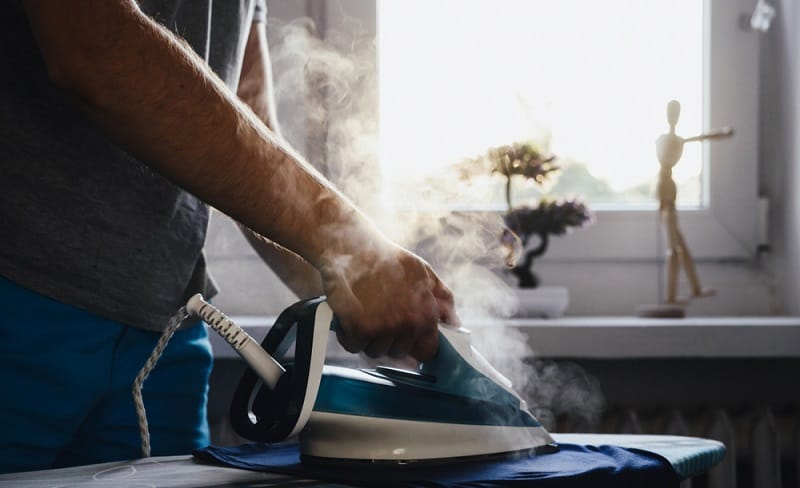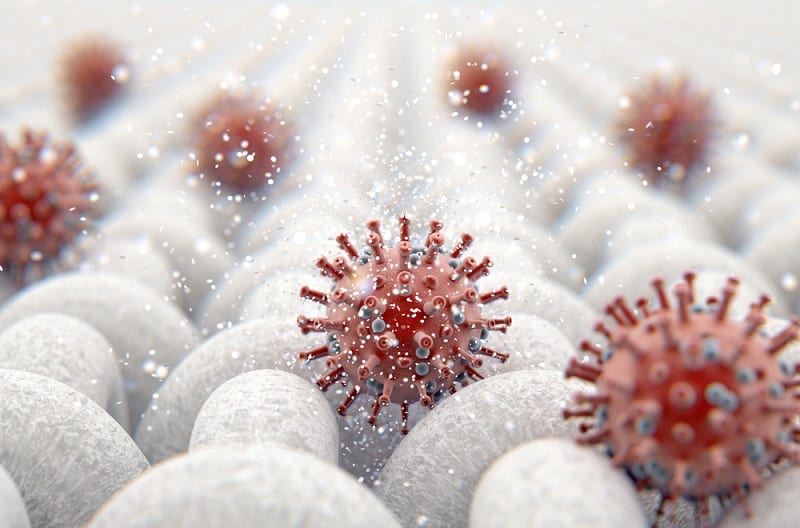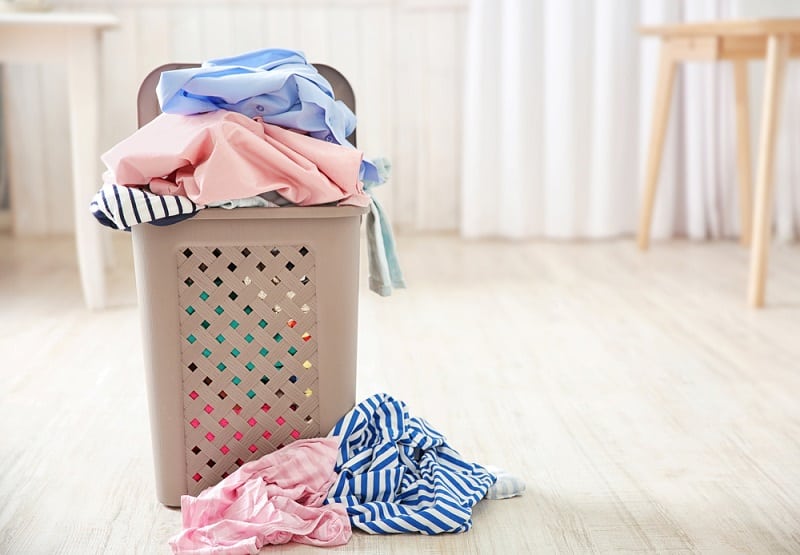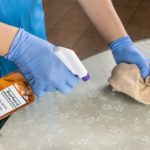If you’ve ever had the misfortune of accidentally touching the bottom of an iron, you’ll know it is HOT! So is the iron hot enough to kill germs?
You would think so, but let’s look a little deeper into the world of germs, bacteria and how to best get rid of them from your laundry!
Can Ironing Kill Germs?
The short answer is yes!
Your regular household iron heats up to around 180°C-220°C which is more than hot enough to kill most known germs!
In fact, many germs will actually die at 100°C which is the perfect temperature for steam to be created – steaming clothes is a great way to get rid of germs from your clothes and even bedding! But the term germs covers a lot of different things.

Different kinds of germs
When we talk about germs we’re referring to microscopic organisms which fall into these four categories:
- Bacteria
- Viruses
- Fungi
- Protozoa
Although these are all given the umbrella term germs, they are quite different and so can be killed in varying ways.
When it comes to clothes, the top three would be the ones to think about – bacteria, viruses and even fungi (in the form of mould) can stay on clothing for a small amount of time unless killed.
Making sure your clothes are clean and dry when you store them away is the best way to avoid fungal spores or mould growing on your laundry. So what about bacteria and viruses on clothes?
Does ironing kill bacteria on clothes?
Ironing is said to kill over 99% of bacteria, as they are being exposed to a temperature exceeding that of 60°C which is the temperature at which many germs will start to die.
So ironing and steaming is a good way to get rid of bacteria on clothes – just make sure to check clothing labels for instructions, you don’t want to singe your favourite dress!
Bacteria is actually what causes smells on your clothes, so ironing and steaming garments is a great way to rid clothes of unwanted odours!

Does ironing kill viruses?
With the current situation at the time of writing this article, COVID-19 has taken hold on the entire world and is getting everyone thinking about viruses, how they are spread and how they can be killed.
Right now, professionals and scientists aren’t sure if ironing or steaming clothes will get rid of the coronavirus, but it definitely doesn’t hurt to try. Steaming can be an amazing way of cleaning soft furnishings anyhow and if it can kill other viruses, COVID-19 could be one of these.
Ironing or steaming would be a good precaution to take when trying to eliminate viruses in the home as most viruses do die when exposed to conditions above 60°C.
Washing your clothes at a higher temperature is also recommended and using soap detergent will help to break down the fats surrounding virus particles.
If you’re looking for cleaning advice relating to coronavirus, see the UK government’s official COVID-19 cleaning advice.
Does ironing kill bed bugs?
Outside of the spectrum of germs are those little living beasties which can cause problems for many homes across the UK – bed bugs. These little blighters live in mattresses and pillows and feed on your dead skin… lovely eh!?
Bed bugs are vulnerable to heat, so ironing would kill them instantly, but it is hard for the iron heat to penetrate deeply enough into a mattress or pillow.
This is where steaming comes in. A garment steamer (or similar handheld product) can definitely do a better, safer job than an iron when it comes to these soft furnishing items!
5 benefits of ironing your clothes
- Kill germs
- Remove bad smells
- Protect your clothes – last longer
- Keeps clothes looking fresh
- Unshrink your clothes – (Yes, there is an ironing technique that can help to bring shrunk-in-the-wash clothing items back to normal size!)
Other Ways to Kill Germs on Clothes
Clothing comes into contact with all sorts throughout the day, germs from bus seats, bacteria from brushing past doorways and even particles from sneezes and coughs…
So it is extremely important that our clothes get just as much effort put into cleaning them as we do the surfaces in our kitchen.
Here are some of the main ways to rid your clothes of germs:
1. Washing on a hot setting
Many germs and bacteria are killed by high temperatures, so cleaning your clothes in a 60°C wash (and perhaps 90°C for towels and bedding) might be a good idea.
Washing at lower temperatures is, of course, best for the environment and cutting our energy bills, but sometimes it’s exactly what your laundry and washing machine needs to ensure a good thorough clean.
However, be very careful with this, as some fabrics don’t fare so well in a hot wash (always check the washing instructions on labels), so you might have to opt for something else.
2. Use laundry cleanser
As we mentioned above, certain clothing fabrics don’t wash well at hot temperatures so perhaps adding in some antibacterial laundry cleanser to your wash cycle would be exactly what you need.
This laundry cleanser from Wilko is pretty cost-effective and could save you money on your energy bills!
3. Use sprays on outerwear that is harder to wash (or not washable)
When you’ve been out and about, you’ll more than likely have worn a coat or some form of outerwear.
Often these are more difficult to wash due to bulkiness or even due to the materials the jacket is made from e.g. coats with a down filling or fabrics with waterproofing.
A fabric sanitising spray like this one from Dettol would be the ideal solution to this problem, so you don’t have to risk ruining your favourite coat.
4. Don’t let laundry pile up
This one can be tough, especially in large households or homes which don’t have much drying space, but one of the best ways to keep clothes as germ-free as possible is to get them cleaned faster.
Putting an item you wore around the house into the laundry basket with a work uniform which has been in contact with multiple forms of bacteria, possible germs and even pollution, would mean that your loungewear would then be subjected to those same germs.
If these items are left in a basket for a long time, with more added on top, the entire pile of laundry could end covered in this unnecessary bacteria. Washing frequently will mean there is less time for germs to spread.


In The Wash is your guide to the best laundry and cleaning products, tips and tricks. Our mission is to solve the UK’s cleaning and laundry dilemmas!






